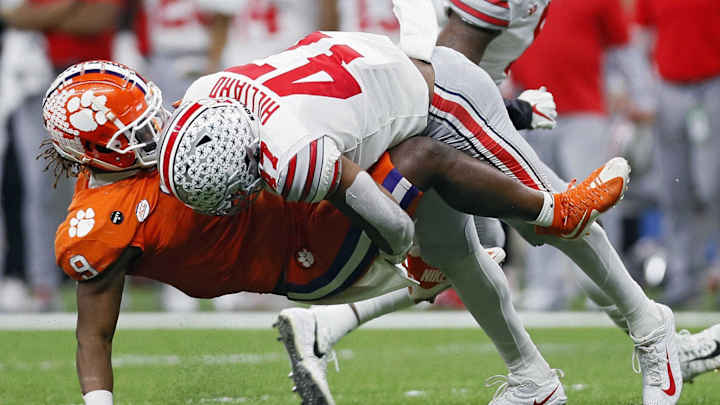With a 12-Team Playoff, More Would Be Less. Eight is Enough.

When I first heard the report that college football’s overseers were pondering a 12-team playoff, I thought, ``Typical. College sports always has a difficult time seeing the obvious.’’
Which, of course, is an eight-team playoff.
Reminds me of the scene in Goodbye, Columbus, a film from the ‘60s in which the father of the main character, Ali MacGraw, wonderfully played by Jack Klugman, owns a plumbing supply business. Her brother, an Ohio State basketball player, sends some of the workers to lunch instead of sending them all at once.
``No fancy deals here,’’ the father says. `` We all go out to lunch at the same time.’’
Which is what I would like to tell the College Football Playoff directors:
No fancy deals here.
Yes, a 12-team playoff addresses some issues. It would create more races: One. . . to make the top four and have a first-round bye. Another. . . to simply make the playoff in the last four.
Some advocates are even saying players will be more inclined to stick around for an important post-season, rather than opting out to reduce their NFL-draft risk for an irrelevant bowl.
To which, I say, Bah. Humbug.
Here’s the problem. When are they going to play those games? On campus in December? Yuk. And what happened to the argument that college teams, by adding another game to the season, will be pushing the physical envelope for players?
Yes, there is an inevitable march toward an expanded playoff in college football—just as there has been in the NFL, MLB, NCAA basketball and every other sport that generates big dollars., whether it’s considered professional or amateur.
And even if the final four is likely to come down to Alabama, Clemson, Ohio State and Oklahoma most years, at least there’s an illusion of more inclusiveness. But that's true whether you start with eight or 12 schools.
Maybe a 12-team college playoff will make sense someday.
But not now.
I kinda hope that by throwing out the 12-team concept, the CFP muckety-mucks are paving the way for an eight-team playoff to look more palatable.
Because it is.
With an eight-team playoff, many questions can be addressed without blowing up the bowl system. The four first-round games can be played as New Year’s Day extravaganzas that give players and fans their bowl experience. The games can be played in warm-weather neutral sites. Automatic berths for five power-conference champions give the ultimate meaning to the regular season. Win and advance. There will be room for a Group of 5 champion if it reaches an attainable minimum standard. And room for worthy runners-up plus an independent Notre Dame.
And that can all be done without shredding the bowl system any more than necessary.
Some hardliners will tell you the bowl system already is in tatters because the games don’t mean anything. I will tell you that sending Indiana or Iowa to San Diego. giving Boston College or Pitt a trip to San Antonio, dangling a trip anywhere to Tennessee or Arkansas as long as there’s a football game involved is. . . meaningful.
And the ESPN television ratings bear that out. America watches this stuff.
By progressing from the current four-team playoff to eight teams, the bowl system also can survive and advance. Quarter-finals on New Year’s Day enhance the bowls involved and will make for a spectacular traditional viewing day. Major bowl venues will clamor for the semi-finals and the championship game, just as they do now.
A 12-team playoff? Nope. Starting it on New Year’s Day will push the season too deep into winter—not that they are likely to do it that way. Playing post-season games on campus runs counter to everything college football embraces.
Take the lesson from the NCAA basketball tournament. Home-court advantages are to be avoided at all costs.
And take the lesson from Ben Patimkin, when his basketball-playing son tries to split-shift the crew on the loading dock.
``No fancy deals here. We all go out to lunch at the same time.’’
